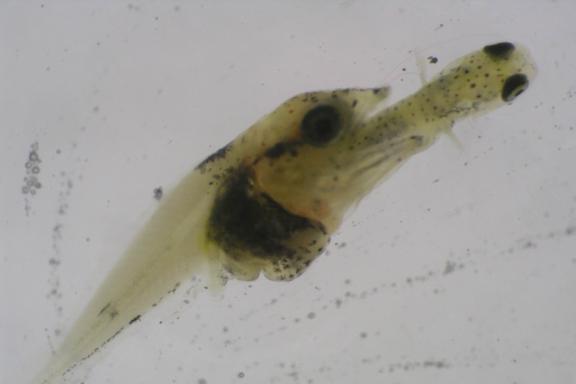
Credit: HZAU
Some mandarin fish species (Sinipercidae) are pure fish-eaters, which feed exclusively on living juvenile fish – also of their own species. A research team led by the Chinese Huazhong Agricultural University (HZAU) and the Leibniz-Institute of Freshwater Ecology and Inland Fisheries (IGB) has described the genome of four mandarin fish species and thus also identified genes for cannibalistic eating behaviour. Knowledge of the connections between the genome and feeding behaviour is of interest for sustainable aquaculture.
Most fish larvae feed on easily digestible, small zooplankton. Not so some species of mandarin fish. These are pure “fish-eaters” already after hatching and feed on young fish of other fish species and on conspecifics. This cannibalism leads to a high mortality rate of juvenile fish and to economic losses in aquaculture.
32 genes make the difference to cannibals
The researchers compared the genome sequences of different species of mandarin fish and were thus able to trace the evolution of 20,000 genes over a period of 65 million years. They were able to link many genes with species-specific characteristics. “For 32 of these evolving genes, we were able to experimentally demonstrate different gene expression in mandarin fish species that are common to other food and in pure fish-eating species,” explains Ling Li, one of the first authors of the study and guest scientist from HZAU at the IGB.
Rapid evolutionary adaptation in predatory behaviour
Mandarin fish are aggressive predators. During the complex genome analysis, the researchers identified so-called candidate genes that are associated with particularly high aggression and affect behaviour. “Our genome analyses show the evolutionary development of mandarin fish. They have adapted rapidly to changing environmental conditions, especially with regard to their feeding behaviour. Today, some mandarin fish species are more aggressive predators than others due to their genetic predisposition,” says Prof. Xu-Fang Liang from HZAU.
“Research on the relationship between the genetic code and feeding behaviour is an important basis for the sustainable aquaculture of these fish. In future, fish farmers will be able to use marker based selection to choose fish for breeding where the genome indicates less predatory behavior – and thus reduce losses,” summarises Dr. Heiner Kuhl, leading bioinformatician of the project from the IGB.
High-throughput genome research at IGB
The reference genome for Siniperca chuatsi is one of the highest quality fish genomes to date. It was analysed using third-generation sequencing techniques and has very high sequence continuity and almost complete reconstruction of the 24 chromosomes. The high-quality reference genome enabled the cost-efficient sequencing of three other species from the Sinipercidae family by means of comparative genomics. This approach to create genome sequences for entire taxonomic families of organisms could serve as a blueprint for large-scale genomic projects.
###
Media Contact
Dr. Heiner Kuhl
[email protected]
Original Source
https:/
Related Journal Article
http://dx.




